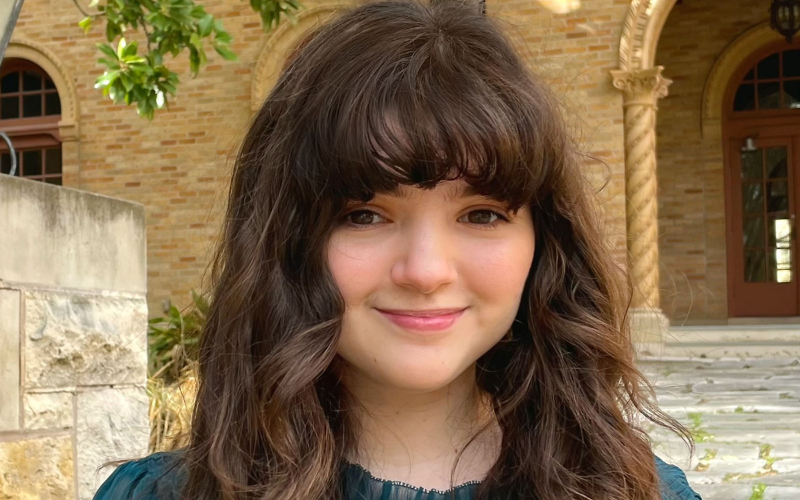
By: Erin Weller
Julia was 15 when she found herself in a napkin gown at the hospital, surrounded by people who seemed so much older than her. She was just a sophomore in high school when she discovered a lump on her breast. By the time doctors confirmed the lump was a tumor, the mass had reached nearly three inches in diameter. Julia had no idea this was something that could happen to someone her age.
“I’m from the Rio Grande Valley, and there isn’t really a big emphasis on cancer education or women’s health,” she says.
Fortunately, the tumor was benign, but even after it was removed, Julia quickly learned that she would need to constantly monitor herself for breast cancer. Even then, she didn’t let her experiences keep her down. Instead, Julia channeled them into a burgeoning research career. At Texas A & M University, Julia had the opportunity to conduct research on how diet can affect breast tumor growth through different genes. From there on out, she knew exactly what she wanted to do.
Julia began studying at The University of Texas at Austin and graduateed in May 2023. Her passion for cancer research and representation among the adolescent and young adult patient population, earned her a unique opportunity in 2021 to participate in Alex’s Lemonade Stand Foundation’s (ALSF) Pediatric Oncology Student Training (POST) Grant Program.
Julia went to New York to conduct research on clinical outcomes of adolescent and young adult patients with sarcomas under mentor and ALSF-funded researcher Dr. Julia Glade Bender at Memorial Sloan-Kettering Cancer Center. Having the opportunity to interact with patients only propelled Julia forward in her passion for childhood cancer research. The team hired her to stay on and continue her work from Austin as she finished her degree.
At Memorial Sloan Kettering Cancer Center, Julia used a retrospective review to investigate whether there is a difference in clinical outcomes between adolescent and young adult patients with soft tissue sarcomas depending on whether they were treated with pediatric or adult protocols. Witnessing very intentional patient-doctor interactions for different age groups was a learning experience that left Julia feeling inspired.
“I was like, wow, these are great doctors. I want to be like that one day,” she says.
Bringing Education to Community Health
When Julia looks back on her experiences, she recalls how alienating it felt as a teenager to stay in rooms alongside people more than twice her age. “I was the only person there that was young, and I was like, I just don’t belong here,” she says.
Living in Texas in the Rio Grande Valley presented some limitations. She explains, “There are facilities like Kettering and Anderson who have these great facilities for the adolescent and young adult population, but in a place where I’m from – the Rio Grande Valley – there really isn’t that kind of representation. So I really want to bring that to more rural and underserved communities.”
By integrating novel bioinformatics techniques into treatments, Julia is determined to use her career to improve outcomes and bring education and innovative cancer treatments to geographic regions lacking resources such as border towns and minority communities.
Julia explains, “Every little thing matters whether it’s cancer research or doing a run or just donating or spreading awareness. A big part of it is awareness, and a big part of cancer is early detection and that can only be done through education.” From her time as a teenager in the clinic to now as she prepares to reenter the lab, Julia has understood that awareness and education have the power to create change.

